Opioid addiction and death mail-ordered to your door
- Published
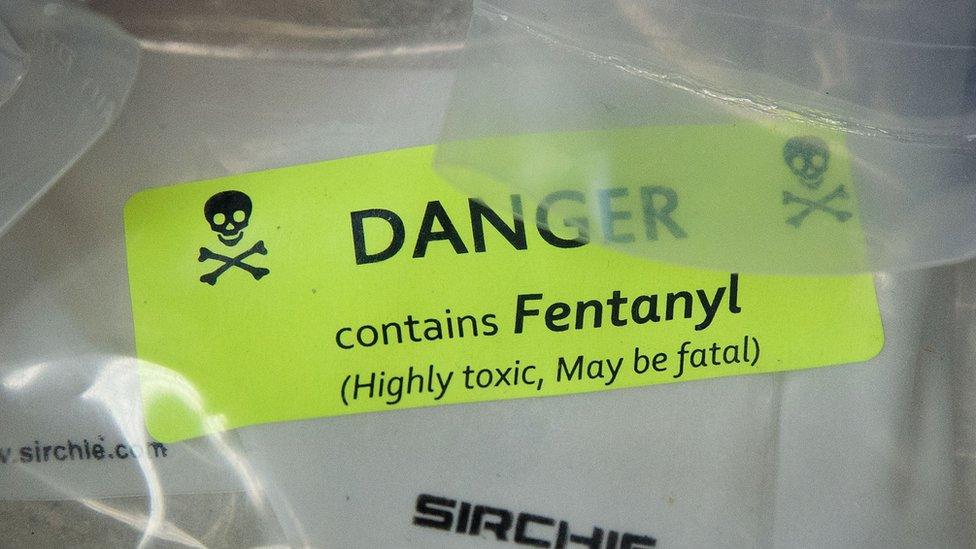
Every day more than a million packages enter the US from abroad through the postal service. As state and federal governments crack down on legally prescribed opioid medication, addicts and dealers are looking to the dark web and the US mail as a new way to acquire increasingly potent - and deadly - drugs.
Van Ingram's voice cracks as he describes the toll opioid drug abuse has exacted on his home state of Kentucky.
"I go to bed thinking about those 1,400 people we lost in 2016 every night," he says. "Thinking about it every day when I get up. It's somebody's son, somebody's daughter, somebody's mother, somebody's father, somebody's sister, somebody's friend. The human toll is just unimaginable."
Ingram has served as the executive director for the Kentucky Office of Drug Control Policy since 2004. Before that, he spent more than two decades as a police officer. He's witnessed first-hand the rise of the opioid drug problem in his state - considered "ground zero" for the epidemic.
It started with doctors - some well-meaning, others operating "pill-mills" looking to turn a quick profit - prescribing opioid painkillers to their patients. Medication was offered a month's supply at a time for one-time injuries and chronic pain, often to treat years of working in physically arduous jobs - like those in manufacturing and the coal mines of the eastern part of the state. The kind of jobs that have been disappearing across the US in recent years.
"If you overexpose a society or culture to cheap, plentiful food, you'll have an obesity epidemic," Ingram says. "If you overexpose a culture to opioids, you're going to have an opioid epidemic. And it wasn't just Kentucky that got overexposed. We just got overexposed first."
An addiction crisis shifts
Kentucky, and other states, eventually enacted legislation to address the problem. The pill mills were shut down. Doctors, who had been told by pharmaceutical companies that the medication they were offering was not addictive, began to realise the consequences of their actions and prescribe less often and for shorter periods.
At that point, however, the damage was done. A population, sometimes whole communities, had become hooked and were now searching for a new way to get their fix.
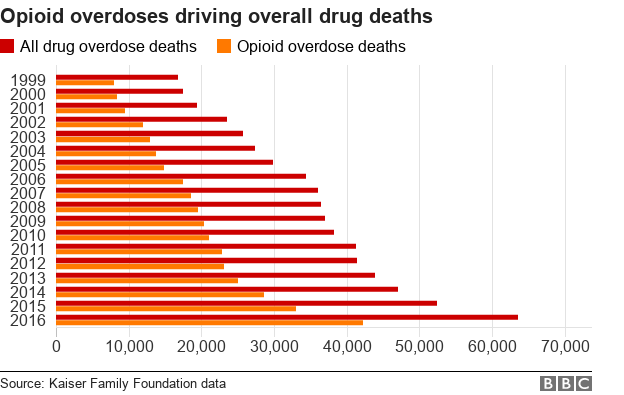
"The good news is we're prescribing fewer opioids in this state and in this country," Ingram says. "The bad news is there's always something to take its place."
What came next was a stream of increasingly more potent drugs, causing overdose fatality numbers to spike in Kentucky and across the US. By last year, more Americans had died from opioids than in the Vietnam, Iraq and Afghanistan wars combined. More Americans die annually from the drugs than are killed in car accidents or firearm incidents. Of the 63,630 recorded drug overdose deaths in the US in 2016, 42,249 were from opioids.
Increasingly, the agent of death is a drug called fentanyl - 50 to 100 times more powerful than doctor-prescribed morphine - which is manufactured predominantly in China and frequently enters in the US in small packages shipped through the postal system.
Nationally, from 2014 to 2015, the number of fentanyl-related overdose deaths increased by 72%, to nearly 10,000. In 2016, that number had doubled, to 20,100.
The 'iron law'
"Emerging year-over-year figures and episodic outbreaks of fentanyl-related deaths paint a grim picture of an uncontained, plague-like contagion," write Professors Leo Beletsky and Corey Davis in a paper on the fentanyl crisis, external published last year in the International Journal of Drug Policy.
In their report, they said that the transition to increasingly potent drugs from illicit - often foreign - sources was as inevitable as it was shocking. A similar pattern emerged when the US tried to ban the sale of alcohol during the Prohibition era of the 1920s.

More on the US opioid crisis
US opioid crisis 'ruining my marriage', says emergency responder

"Described as the 'iron law of Prohibition'," they write, "this phenomenon follows fundamental economic logic. Imposing substantial barriers and costs to the illicit drug supply chain creates direct pressure to minimise volume while maximising profit. More bulky products become more expensive relative to less bulky ones, incentivising increases in potency."
With alcohol, that meant less beer and wine and more gin and moonshine. Contraband flooded across the Canadian border and through US ports.
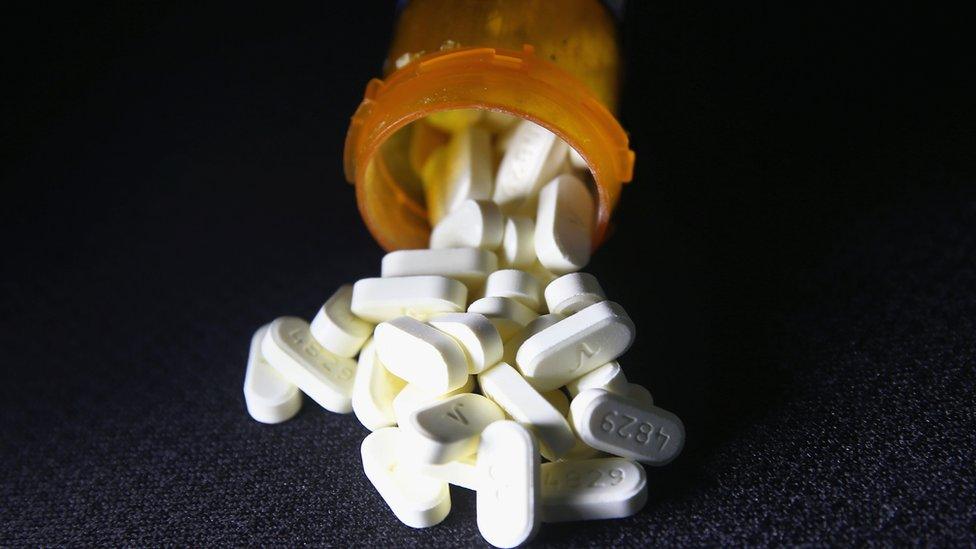
The US opioid addiction crisis started with prescription painkillers - but it didn't end there.
In the opioid era, the prescription pills of the early 2000s were replaced by heroin, fentanyl and carfentanil - a medication first used as an elephant tranquiliser that has 10,000 times the potency of morphine.
Where heroin, an agricultural product derived from poppies, mostly entered the US across its southern border from Mexico, the new opioid drugs are most frequently manufactured in Chinese laboratories and, because of their potency, are much easier to transport through the international postal system.
The purchasers are sometimes criminal cartels, which then distribute the drugs through a decentralised dealer network scattered across small towns and suburbs throughout the US. Last autumn police in Columbus, Ohio, seized more than 24lb (10kg), external of fentanyl - an amount large enough to administer lethal doses to the state's entire population of 11.6 million.
Other times, the purchasers are the users themselves, who order through the so-called "dark web" or from more easily located internet sites.
"It actually gets delivered to your house," Ingram says. "The millions of parcels that are coming into this country every day, it's like a needle in a haystack."
'Fentanyl for sale'
The number, to be precise, is 498 million packages in 2017, averaging 1.36 million a day. And, of that amount, only a fraction are screened by customs inspectors. About 64% - 318 million items - have no electronic data included with the shipment, making advanced, automated detection next to impossible.
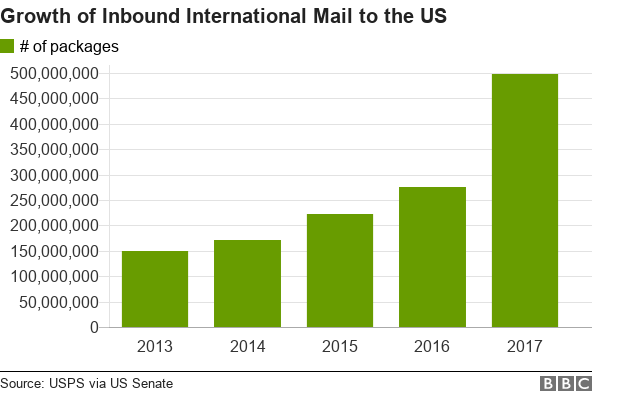
"The only way to tell trends and do investigations is if you have at least semi-reliable data coming from who the sender might be," says Juliette Kayyem, who served as assistant secretary of homeland security for intergovernmental affairs during the first two years of the Obama administration. "If you begin to put a security apparatus over something, the market will leave that gap."
Last month, the US Senate Homeland Security committee released the results of a year-long investigation that outlined just how big the gaps presently are.
Senate aides Googled "fentanyl for sale" and contacted six online sellers. They exchanged emails and were given information about how they could purchase fentanyl and newer opioid compounds - using cryptocurrencies like Bitcoin and even PayPal, credit cards and prepaid gift cards. They were notified of "flash sales" and other special deals on their products.
Further investigation revealed that those contacted sellers had completed at least 500 transactions with Americans in 43 states amounting to hundreds of thousands of dollars. Seven individuals identified by the investigation who received shipments from one of the online companies later died of opioid overdoses.
Obstacles foreign and domestic
The Senate report detailed the numerous obstacles the government faces in trying catch the "needles in a haystack," as Ingram put it. First and foremost is the lack of what's termed "advanced electronic data" on incoming packages. Global postal mail is governed by a treaty called the Universal Postal Union (UPU), which requires the postal services of the 192 member-states to receive and deliver all items presented to them from their foreign counterparts.
Gathering data - whether in written or electronic form - is the obligation of the local postal agency, which means the information the US post service and customs relies on to screen packages can be spotty and often contains errors or is total gibberish.
The UPU, following recent negotiations, will require 80 nations to have electronic information on a portion of their packages by the end of 2020. Some countries - like China - are making significant progress, but the enforcement mechanisms are limited.
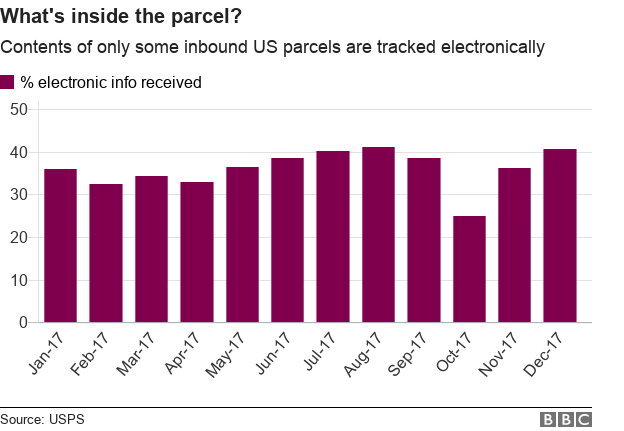
"There is a difference between the technical ability to exchange data and the realised ability to collect and enter it for a significant part of the mail stream," Joseph Murphy, international postal policy unit chief at the US Department of State, said during testimony before the Homeland Security Committee in January. "Many post offices in parts of the developing world lack internet connectivity and reliable sources of electricity, which complicates collection and transmission of data for postal items they take in."
In the end, there's still no guarantee that the contents detailed in any shipment are accurate, and when the volume is in the hundreds of millions annually, no system will be totally effective. In 2017, CBP seized 1,476lb of fentanyl - which was up from 544 the prior year but still a tiny portion of the estimated overall postal drug trade.
Then there are the domestic bureaucratic challenges. A 2015 pilot inspection programme at New York's John F Kennedy Airport, one of five US entry points for international packages, was riddled with delays and missteps. Senate investigators found that the US Postal Service and US Customs and Border Protection - which provides actual screeners - were often less than effective at sharing information and locating items flagged for inspection. The two agencies, they noted, simply had different organisational missions.
"The Postal Services' mission is the speedy processing and delivery of mail, while CBP's mission is to protect the US border and prevent illicit items from entering the United States," they wrote.
A congressional proposal
Congress is currently considering legislation, called the Synthetic Trafficking & Overdose Prevention (Stop) Act, that would require the US Postal Service to have advanced data on all international packages they allow into the US.
Advocates for the bipartisan legislation, which has 29 co-sponsors in the US Senate, say the bill would simply impose the same obligations on the Postal Service as are on private companies like FedEx and UPS, which gather shipping information from the point of receipt.
Critics counter that foreign nations won't be able to comply with the legislation, they could refuse outgoing US mail as a result, and the US Postal Service would face an uncompensated financial burden amounting to hundreds of millions of dollars annually to screen incoming packages.
"The US Postal Service is deeply concerned about America's opioid crisis and is working aggressively with law enforcement and key trading partners to stem the flow of illegal drugs entering the United States," said Kimberly Frum of the US Postal Service in a statement to the BBC. "Unfortunately, the Stop Act does not recognise the relevant distinctions between commercial and postal operators, and also includes provisions that are not directly related to strengthening global security.
According to Kayyem, who is currently a lecturer on international security at Harvard University, other nations may complain, but they will eventually come around if the US takes a strong stand.
"What I've discovered being in this field for 20 years is the United States, for better or for worse, sets the floor for global security standards," she says. "We know that if we move, it's obviously going to require international co-operation. But if we don't move, this will never be addressed."
Kayyem, who supports the legislation, acknowledges that it's only part of the solution, however.
"I'm in the world of risk reduction, not risk solution," she says. "Things will probably still get through. But we can show we've closed a loophole and taken it seriously.
It's a sentiment that, back in Kentucky, Ingram echoes. The opioid addiction problem isn't going away anytime soon.
"This is a problem that's two decades in the making," he says. "There's no one programme, one fund or one policy shift that's going to turn this ship around overnight. We're in for a decades-long fight."